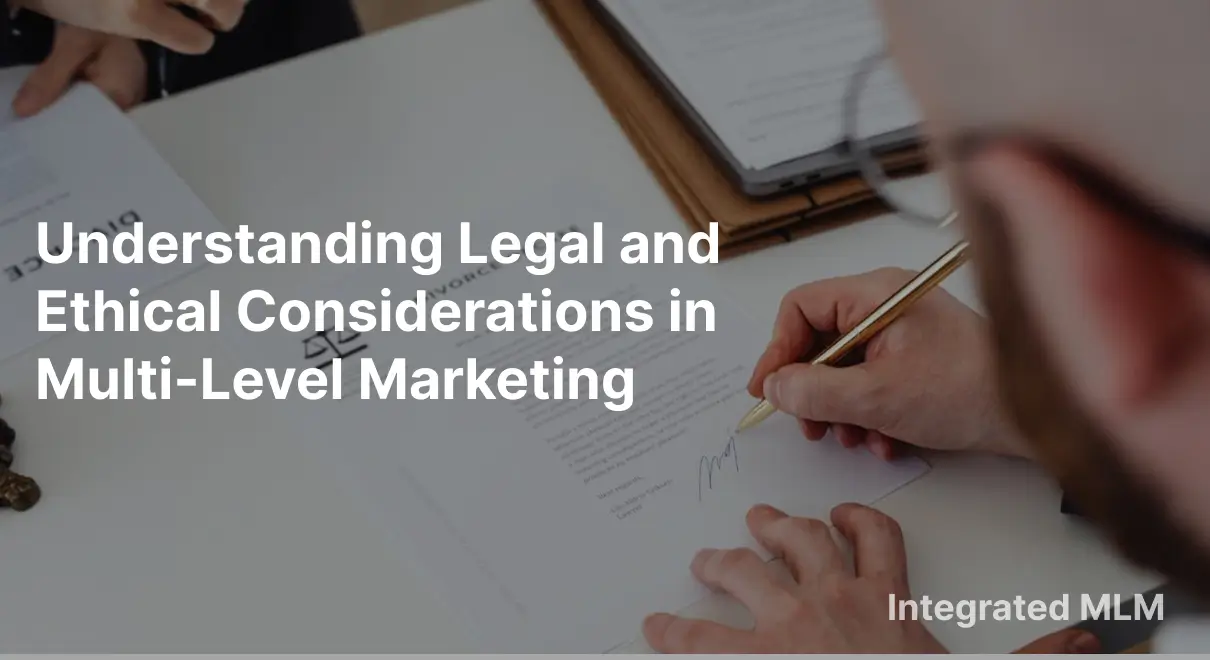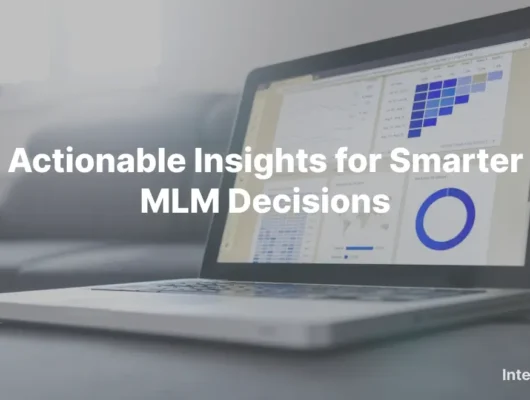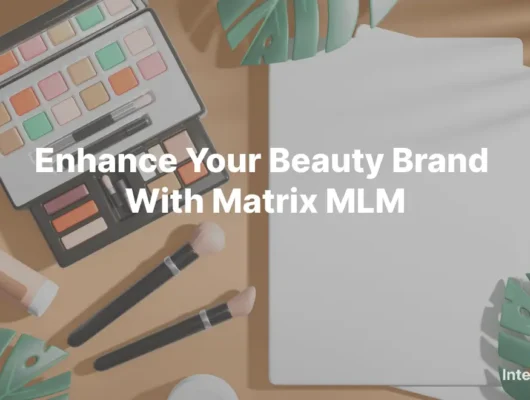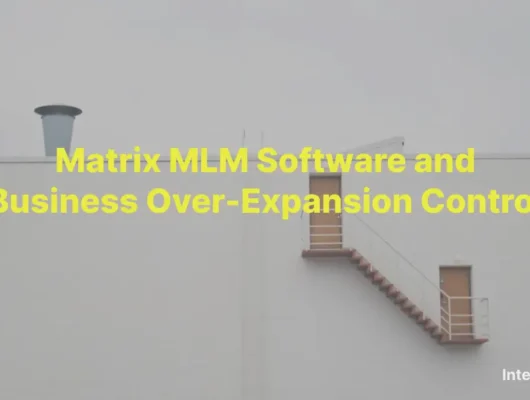In the 1930s, Carl Rehnborg, the founder of Nutrilite, had a brilliant idea to stand out in the market flooded with cheap synthetic supplements by directly educating customers about the superior naturally-sourced alternative. This birthed the modern Multi-Level Marketing (MLM), which has since grown into a $201 billion industry by 2022. Zion Market Research projects a staggering $329 billion by 2030.
However, the contemporary pyramid schemes stained the industry’s reputation inviting stringent legal and ethical scrutiny. The MLM model was criticized for its operational practices as early as the 1930s, leading to the establishment of the industry’s first code of ethics in the United States.
Table of Contents
Understanding Legal Challenges
While network marketing offers financial success, it comes with numerous legal considerations that need to be carefully treaded:
1. Business Structure:
Choosing the right business structure establishes a firm legal ground. For example, Sole-Proprietorship is easy but comes with unlimited liability. A corporate structure shares ownership but benefits from multiple perspectives and limited liability.
2. Pyramid Schemes:
To distinguish from an illegal scheme, an MLM should:
- Maintain a healthy ‘Retail-to-Recruitment ratio’. The landmark 1979 Amway v. FTC (Federal Trade Commission) case made Amway restructure its business based on:
- The 70% Rule where 70% of all income comes from retail sales.
- 10-customer-rule where distributors will do at least 10 retail sales every month.
This prevents inventory loading, focuses on recruiting, and promotes sustainable sales of the product.
3. Legal Ambiguity:
To ensure compliance, study the legality in product claims, compensation plans, and distributor agreements, as numerous laws and regulatory bodies are involved. Document sales, expenses, and taxes and seek legal counsel early from professionals specializing in MLMs.
4. Transparency:
Provide accurate information about compensation and business risks. (In 2016 Herbalife paid FTC $200 Million addressing pyramid scheme allegations)
- Set realistic goals, motivation, and avoid hidden fees and complex distributor agreements. Make clear criteria of earning commissions and incentives such as personal sales, team volume, and rank advancement.
- Promptly disclose policies and modifications to the distributors.
5. Cooling-off, Cancellation, Refunds, and Buyback:
Have responsive customer service, solid cancellation and refund policies for the customers. Give a cooling-off period to cancel the contract without penalty, along with an inventory buyback policy for the distributors.
6. Contractual Agreements and Distributor Rights:
Clearly outline rights, responsibilities, and whether the distributors are restricted from selling competing products.
- Classify distributor status as an employee or independent contractor. For employees, the company withholds income tax and ensures social security. Independent Contractors do their own taxes but deduct business-related expenses from their taxable income (E.g., Vemma Nutrition Company v. FTC).
- Alongside aligning with consumer-protection, this will help welcome the right talents into the company.
7. Termination and Disputes:
Have proper termination and internal dispute resolution mechanisms, such as ombudsman, in place to avoid legal battles arising from unfair terminations.
- BurnLounge took a hit when the court ruled against its contractual terms in BurnLounge, Inc. v. John Taylor.
- Include arbitration and mediation clauses in contracts to streamline dispute resolution even the cross-border ones.
- Understand the forums for national and international litigation in case the disputes escalate. E.g., Singapore International Arbitration Centre.
8. Cross Border Legalities:
During global operations, MLMs will encounter a unique blend of regulations for each jurisdiction. In the US, FTC plays a pivotal role whereas in Germany, it’s the consumer-protection laws.
- Distributors receiving payments in foreign currency must comply with exchange rate fluctuations and tax implications. E.g., Anglo-American Avon’s MLM model was challenged by China’s Direct Selling Regulations.
- Explicitly mention which laws govern the business agreements to reduce ambiguity. For example, a distributor agreement must state that Spanish Law applies regardless of distributors’ location.
- Do not forget local regulations and consumer protection laws such as disclosure agreements, cooling-off periods, and refund policies as well as income tax, Value Added Tax, and Custom Duties. E.g., Brazil’s Consumer Defence Code mandates disclosure of product prices, terms, and cancellation rights.
- Learn the laws of Work Visa, remittances, and currency conversions well ahead of cross-border recruitments.
Understanding Ethical Challenges
Ethical commitment is the true testament to the sustainability of an MLM model. Transparency, product quality, and respect for the rights and privacy of the employees are at the helm of it.
1. The False Claims fault MLMs internally and externally. Internally, the ‘get-rich-quick’ claims by the distributors paraded as “the ones-who-made-it” attract socially vulnerable groups such as mothers of small children, the differently-abled, or immigrants.
Externally, for instance, a distributor signing into a healthcare MLM may automatically assume a health-advisor role backed by in-house trainings.
With their rose-tinted glasses on, they profess inflated claims about how the product is a cure-all for all health issues and how it can make the customer a happier, healthier, and better human being and takes advantage of customers’ insecurities.
2. Effective monitoring must ensure distributors are not conveying unrealistic lifestyle claims. Avoid promising riches and disclose the modest incomes. The Company’s Code of Ethics must ensure ‘accurate and complete disclosure’ of market-potential of products.
Don’t propagate what is not practiced. Substantiate product claims with scientific studies, testimonials, and expert endorsements. Companies must also learn to strike the right balance between creative freedom in advertising and the compliance regulations to achieve optimum potential.
In healthcare or finance niches, participants must qualify independent, certified, and professional training before they actually hit the ground. This helps in building trust with even the sceptical customers.
3. The Cult: The MLM’s cozy atmosphere allows distributors to constantly reassure each other of success to keep up their morale. However, prevent spiritual, religious, or moral statements by participants to avoid the company turning into a cult or quasi-religious entity.
4. Private Social Relationships as the ‘Warm Market’: Friendships restrict the ‘consumers autonomy’ or the free decision to buy the products / join the company or not. Hence promoting business almost everywhere, in dinner parties, and leisure clubs becomes unethical exploitation of social trust.
Role of Network Marketing Software
The Multi level marketing App or MLM Software can help in the following ways:
1. Automate the business workflow from Training and Onboarding to a friendly Real-Time-Monitoring of sales practices to avoid human errors and ensure legal and ethical regulatory compliance.
2. It can also help disclose the accurate average earnings to make sure the Retail-to-recruitment ratio is maintained according to the established guidelines.
3. A customizable MLM software can help document order tracking and inventory management that will later help in addressing cancellation and refund claims.
4. To guard against illegal transactions, a Network Marketing Software helps to integrate with reliable payment gateways and e-wallets.
5. In cases of inventory loading, an MLM app can keep a tab on unsold inventory anywhere in the network and trigger an automated buyback policy.
6. An MLM software helps instate a fair and equitable compensation plan to reward sales than recruitment, backed by real-time data. This helps avoid human errors and establish trust and predictability in the minds of distributors.
A plethora of compliance guidelines are in place to regulate the MLM model. However, nothing ensures safe and sustainable growth for the venture as much as clear objectives, regular audits, and a sound ethical environment that welcomes and learns from genuine feedback the stakeholders involved.





